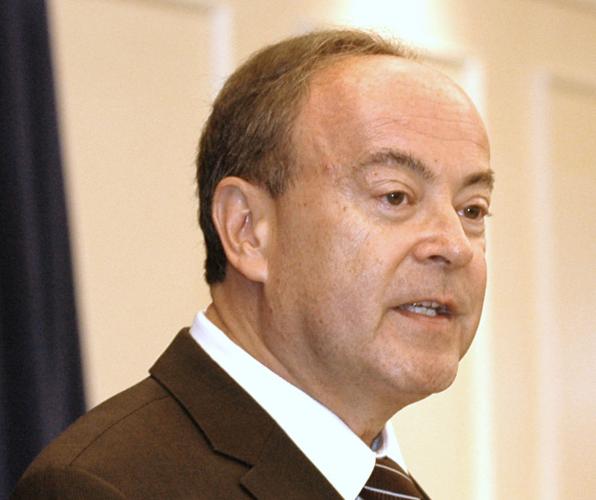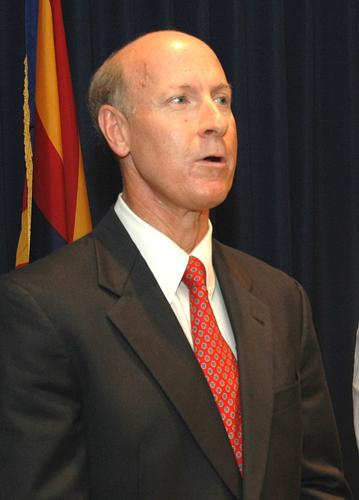Heavy hitters and relative unknowns have come out to argue it would be wrong to vote against retaining Justice Clint Bolick.
Both are Arizona Supreme Court justices, and both are up for retention in this state election. The retention of justices is usually a foregone conclusion, but it became an issue after the Supreme Court struck down the Invest In Ed initiative Aug. 29, saying its drafting was too flawed to be on the ballot.
Some supporters of the initiative reacted to the ruling by saying “remember in November” — that people should vote against the justices who are up for retention because of the ruling. Of course, we don’t even know who voted which way because the court, unconscionably, still has not released its opinion on the case.
The opposition left Bolick’s powerful connections aghast, and his less powerful ones too. A former law clerk of Bolick’s penned an op-ed for the Star defending him. Bolick has long been a big player in conservative legal circles and is well-loved at the Wall Street Journal editorial page, too. That paper published an editorial Oct. 2 sternly warning that Arizona voters should not vote against retaining Bolick. Or Pelander.
I’m writing it that way because Pelander is not the issue. He’s a taciturn and traditional judge, appointed by Republicans, who has done nothing particular to merit rejection. I used to play basketball with him occasionally at the downtown Tucson YMCA almost 20 years ago, and I hardly remember him saying a word.
The real issue is Bolick. Known for his charm and ready smile, Bolick has also been a street fighter in conservative political battles on race issues in his work for the Institute for Justice and the Goldwater Institute, something barely considered when he was nominated.
Bolick, who had worked for Clarence Thomas in the Equal Employment Opportunity Commission, was among those who defended Thomas against accusations of sexual harassment by Anita Hill in 1991.
Bolick went on to help defeat Bill Clinton’s civil-rights appointee Lani Guinier in part by labeling her a “quota queen” — a play on “welfare queen.”
And he fought the appointment of Bill Lann Lee — a competent and moderate appointee, as Bolick himself acknowledged — as the head of the Justice Department’s civil rights division in 1997. A Chicago Tribune writer said of Bolick’s campaign: “The assault on Lee takes nominee-bashing to a new level; it institutionalizes it.”
There is no reason that Clint Bolick, of all people, should be protected from politics when he eagerly launched partisan political attacks for years. Many judges are political animals, and they should be remembered as such, not revered as impartials the moment they don the robe.
My former colleague Tom Collins reminded me and the public, via Twitter, of Bolick’s history in recent weeks. Collins, a Star reporter years ago, went on to law school and clerked for four years at the Arizona Supreme Court. He thinks Bolick has been given a free pass.
Collins has worked for years as the director of the Arizona Citizens Clean Elections Commission and has clashed with Bolick in that capacity, but was not speaking for the commission about him. Before Collins was there, in 2011, Bolick was part of a legal team that sued the commission and its staff, both in their legal and personal capacities, over a campaign funding issue, representing a group founded by then Tucson Sen. Jonathan Paton.
“They sought to have the commission and commission staff held personally liable,” Collins noted. Of Bolick, he added, “You have a justice who thinks he can still act as a litigator, but who as a litigator is a particularly nasty guy.”
Bolick is also a judicial activist, Collins argued. And that came out in the case decided last year, over whether the city of Tucson could destroy seized guns.
Pelander, the other justice up for retention, wrote the majority opinion finding that Tucson’s practice of destroying rather than selling seized guns violates state law and must end. Bolick agreed but wrote a separate opinion, arguing that the court should go beyond the specific issues raised in the case and reconsider the whole realm of charter cities, home rule and state law.
“While thought-provoking, Justice Bolick’s concurrence is puzzling not because of its content but rather because of its gratuitous nature,” Pelander wrote in the majority opinion. “We generally do not reach out to decide important constitutional issues or to upset established precedent when no party has raised or argued such issues.”
Tucson City Attorney Mike Rankin told me Thursday: “I agreed with Pelander’s characterizaton of how far Bolick was wanting to go with the decision. It wasn’t necessary to the case and it wasn’t part of the issues presented to the court.”
Among his characteristics, Bolick is also an especially open person for a judge, and he called me back Thursday to talk about his retention.
He told me he thinks voters should consider two main qualities when considering retaining judges — whether they are in the mainstream of legal thought, and whether they are competent.
On the Tucson case, Bolick said, the majority opinion relied on a Supreme Court precedent that he thought was of questionable constitutionality.
“I respect precedent, but we don’t take an oath to precedent — we take an oath to the constitution,” he said.
On politics, he said, voters should consider whether judges can divorce their political beliefs from the law, as he has.
“I think there are judges who aren’t able to divorce the law from politics. I welcome the skepticism, but I also invite people to examine whether it’s true” in his case, he said.
He noted he has a website, www.azjustice44.com, where he posts all his rulings.
I appreciate Bolick’s openness, but I also think voters should feel free to judge his performance as they choose, not be cowed by the idea that voting “no” is inserting politics into what is already a political process.
Barely a Democrat
U.S. Senate candidate Kyrsten Sinema seems determined to test how far into the center she can move without losing voters on the left.
On Wednesday, Phoenix radio hosts Mac and Gaydos asked Sinema a perfunctory question, whether she is a proud Democrat, and she showed how far she is willing to go to prove her bipartisan credentials.
She answered: “Oh gosh, it’s hard to say proud. I don’t know that — I am not sure that people are even proud of parties anymore ’cause I feel like the parties are, ugh, not doing a good job. So, I would say that I’m a proud Arizonan. That’s something I’m very proud of. And I’m proud of the work that I have done in Washington, D.C., and the work I’ve done in the state Senate and the state House before going to Congress. But I’m not particularly proud of the parties.”
Liberals were already skeptical of Sinema, so it’s hard to know if this will lose her any votes. But she is totally committed to the idea that winning Arizona’s center is the key to winning the Senate seat.
“hot” rhetoric once troubled McSally
Just last year, Rep. Martha McSally was warning us not to be bystanders or facilitators of hot political rhetoric that could lead unstable people to violence, as Paul Weich of Arizona’s Politics reported.
McSally, speaking after the attack on a Republican congressional softball practice that nearly killed Rep. Steve Scalise, said this to MSNBC:
“Everybody in our country and community, we need to look within our hearts and make sure that we’re not being facilitators or bystanders in creating an environment where it is so hot that perhaps — the investigation is still ongoing — but, perhaps unstable individuals will be unleashed to violence in this environment. So, we each need to do our part to ratchet this down and find where we can unify together and be civil about our disagreements.”
On Monday at the senatorial debate in Phoenix, McSally accused Sinema of “supporting treason,” and in comments after the debate, appeared to accuse her directly of treason. Apparently that doesn’t count as “hot” rhetoric.
No Giffords endorsement
Gabrielle Giffords, who was shot in an attempted assassination in 2011, condemned McSally’s treason comments.
“Throwing around serious charges just to get a leg up on a political opponent in an election is irresponsible and dangerous,” Giffords said via Twitter. “We need leaders who understand that words matter, because words lead to action.”
Surprisingly, although Giffords has endorsed six Arizona congressional candidates as well as the Democrats running for attorney general and governor, she has not endorsed Sinema. Neither has she endorsed her former Democratic colleague Rep. Raúl Grijalva.
Foes of Grijalva once worked with Stegeman
The latest campaign filings show clearly who is behind the independent-expenditure committee that is opposing Adelita Grijalva for TUSD school board.
Pilar Ruiz, who is running the campaign, has loaned the committee $3,000, and Dale Keyes has donated $1,000. Both are former campaign officials for current board member Mark Stegeman, though Ruiz has said Stegeman is not involved in the effort.









